The Island this morning faces at least one more day of the national banking holiday. Telegrams from the United States treasury notified Vineyard bankers last night of the extension of the holiday through Friday. The Island was encouraged, however, by repeated statements from Washington that there would be little delay in reopening sound banks.
Living cheerfully through an experience which is certain to rank as one of the great economic crises of this country’s history, Vineyarders played their part this week with more curiosity than complaint. Everywhere on the Island there was speculation as to the effect of the holiday, and the steps being considered to end it.
Suddenly shut out of their banks without warning, Islanders proceeded to cooperate in friendly fashion to get through the abnormal time, and there were few discordant spots in the general united front. The Island’s ready cash was circulated as much as possible, and checks or credit sufficed when cash was insufficient. The sending of cash off-Island was looked upon as something akin to betrayal, since the limited supply here could not be increased until the opening of the banks.
Banks Reach Understanding
An understanding was reached between the two Island banks Monday morning that checks should be used, within certain limits, to permit the carrying on of business as usual. Although no checks could be cashed at the banks, they could be used as a medium of exchange for purely local transactions, and the banks, without paying out or receiving money, could transfer from one person’s account to another. Money or checks could also be received at the banks, to go on deposit at the end of the bank holiday.
S. C. Luce Jr., of the Martha’s Vineyard National Bank, conferred with a group which included most of the business men of the town on Monday morning, and explained exactly what had happened. Later he had a similar conference in Oak Bluffs. Arthur B. Hillman, of the Edgartown National Bank, remained at the bank and answered the inquiries of anyone who had a problem on his mind.
Several changes of instructions followed the first order which closed the banks. The original order prohibited the opening of the vaults and also specifically forbade the making of change. This was modified later, and the banks were permitted to make change, but not to pay out any gold or any gold certificates under any conditions.
At his conferences with business men, Mr. Luce emphasized the liquid condition of the Martha’s Vineyard National Bank which, he said, was in a position to pay every depositor in full at once. He said the possibility of a bank suspension had been foreseen, and that the bank had taken steps to meet any contingency which might arise. To those who inquired, Mr. Hillman also made it perfectly clear that there was no need for the slightest concern about the Island banks.
There was no apparent uneasiness about the safety of deposits. The public in all the towns seemed interested, cheerful, and disposed to take a humorous point of view. Most of the conversation, after the first general knowledge of the holiday, concerned individual predicaments due to the lack of cash. Those who were lucky enough to have money in their pockets were good humoredly envied by those who had been caught with only a few cents.
Both Island bankers, Mr. Luce and Mr. Hillman, happened to be among the number caught with a small amount of cash in their pockets, and were as unable as anyone else to get more.
The holiday did not get fairly started on the Vineyard until Monday, orders being received too late Saturday to forestall the opening of the banks. There was some inconvenience Saturday afternoon due to inability to cash pay checks at various stores. The hardship fell particularly on those whose credit was not considered sound, but storekeepers said few cases arose which could not be taken care of quickly.
Many Vineyarders did not know of the holiday until late Saturday, and there were many humorous incidents as the result of innocent attempts to cash checks or obtain change in anticipation of Sunday.
Merchants in general urged their customers to use their charge accounts, and credit was offered liberally to old and new patrons. Checks on the Island banks were accepted freely.
Gas stations, groceries, barber shops, movies, and all sorts of business urged the public to buy as usual.
Chain Stores an Exception
The chain stores were the only conspicuous exception to the general rule. Leo Pepin, manager of the first National Store in Vineyard Haven, said that he received orders that nothing but a strictly cash business was to be done. He protested to his superiors, and the order was modified. No change was given, however.
The Edgartown First National store refused all checks Monday, but was notified Tuesday morning that local checks for the exact amount of sales could be accepted. No credit was permitted.
The Atlantic & Pacific chain gave orders that no checks or credit were to be honored, and this order remained in force through the week, although Frederick W. Smith, manager of the Vineyard Haven store, and other managers took up the matter to try for a withdrawal of the ruling.
Throughout the week, the chain stores adhered to the policy of shipping cash to the mainland daily. Most of these shipments were made by express, according to orders from the mainland. This practice tended to drain currency from the Island at a time when it was impossible to replenish the supply. It was in direct contrast to the policy of all locally owned business conditions as much as possible.
Local merchants, realizing that the circulating cash was small in volume and likely to get smaller, helped keep the available supply moving. They made change and even gave change when checks were presented for payment when they were able to do so. Some turned cash into the banks. Bitter arraignment of the chain store policy was heard from local businessmen on every side, especially when the orders arrived for the shipment of cash by express.
No one took advantage of the state police offer to care for money, though at least one A. & P. store at first was inclined to do so.
Because the town of Oak Bluffs was without normal police protection, Corporal Robert Ferrari offered state police protection for the town during the hours between the relief of the night watch and the hours of opening stores.
The emergency stressed what a certain type of economist has long preached, namely that the ultimate consumer who settles his account periodically, establishes the best line of credit. Captain Ralph M. Packer, superintendent of the Texas company, said that he was allowed to accept checks, providing they were not endorsed. This offered a problem, as his truck, retailing oil, brought in many checks made out to the driver. Checks could not be received from customers who had been in the habit of paying cash, he said, and, of course, no checks save those on Island banks.
The Standard Oil company also arranged for the continuation of business, and no customer of either firm went without a supply.
Postoffices reported that they were refusing many requests from the public for change for large bills. It was impossible to comply with such requests, postmasters said, because of the limited amount of change available.
Edgartown fishermen and others were paid in small checks by the Eldridge company, the checks being written for even amounts and change given for uneven balances. This arrangement facilitated trading with local stores. The windy weather, however, held up the fishing to a large extent during the week.





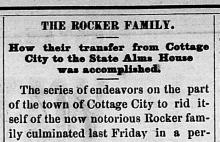
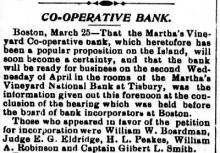
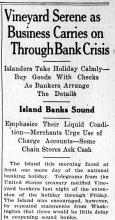
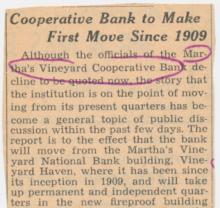
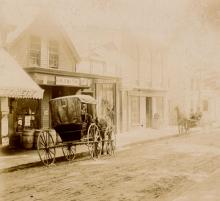
Comments